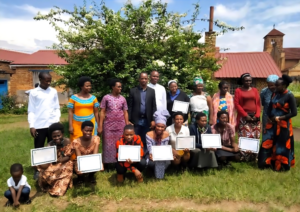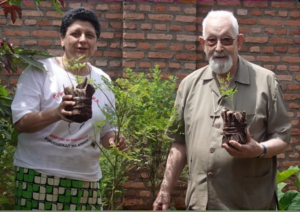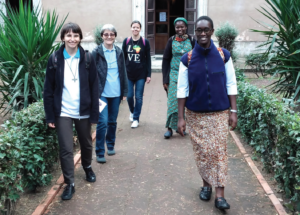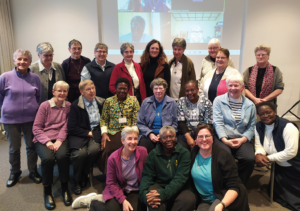
Safeguarding of minors is a crucial aspect in our apostolates.
Earlier this year, Sr. Justine Akampamya obtained a Safeguarding Diploma from the Gregorian University in Rome. The 5 months course gave her an introduction to the many issues in diverse fields which touch on this topic of safeguarding. She also learned how to apply practically the newly gained competencies and drew up an action plan for the cultural background in Chad. Sr. Justine shares on this.
I am glad to have had a training on safeguarding of minors.
As daughters of Lavigerie, we are passionate about Justice, peace and integrity of creation. Today, my personal analysis integrates the safety of a human being in “the integrity of creation”. We are a unique creation.
The children of this universe are to be raised in an integral manner to facilitate their holistic development. As an educator who spends most of my time with children and youth in schools, the safeguarding formation enlightened my understanding and offered responses to questions that
had not been answered for many years of encountering young people both in class and outside.
Safeguarding of minors is a need and it is not so much about protection but it’s rather the action taken to promote the welfare of children and protect them from abuse and maltreatment.
The focus is not to find who is the abuser or the victim but it’s rather on preventing the abuse to happen.
This is our mission today. It can only be achieved through working in collaboration with others as well as people in various fields of study such as counsellors, psychologists, local chiefs as well as civil servants.
For the past 3 years I have encountered young boys and girls who suffer from maltreatment of both neglect and sexual abuse. Most of these
children display post traumatic disorders in learning environment. They need extra attention, certainly one needs to be present, to listen to their story. In most cases we judge and brand them unknowingly, while they have a painful story to tell.
The best approach is the one that Pope Francis is inviting us to in his letter “His Holiness Pope Francis to the People of God” (20 August 2018):
“It is essential that we, as a Church, be able to acknowledge and condemn, with sorrow and shame, the atrocities perpetrated by
consecrated persons, clerics, and all those entrusted with the mission of watching over and caring for those most vulnerable. Let us beg forgiveness for our own sins and the sins of others. An awareness of sin helps us to acknowledge the errors, the crimes and the wounds caused in the past and allows us, in the present, to be more open and committed along a journey of renewed conversion… ‘If one member suffers, all suffer together with it’, said Saint Paul. By an attitude of prayer and penance, we will become attuned as individuals and as a community to this exhortation, so that we may grow in the gifts of compassion, justice, prevention and reparation.”
With the conviction to offer a contribution on this delicate apostolate I made a safeguarding preventive plan to be executed in schools of our
Parish “Notre Dame de la Trinité” in Deli, Chad, first to train the team that may in turn sensitize both youth, students, parents and the community as a whole. While sharing my inspirational plans with the vicar general of the diocese and the Bishop, the plan was adopted for the diocesan safeguarding team to cater for all youth groups. There are many pastoral opportunities to facilitate the programme. The diocese has opened its doors to safeguard minors. There is already a diocesan safeguarding team that needs only to be reinforced, we have youth at hand in schools and active lay apostolate movements, the diocese has experts in Canon Law, medical doctors, spiritual directors as well as educators from men and women religious, priests and lay faithful.
However, there are great pastoral challenges that are likely to move the activities at a snail’s pace. These may include:
- The cultural mentality that treats maltreatment and early marriages as normal.
- The victims are ignorant about possibilities to look for accompaniment, or they are unable to disclose the problem and be helped. This is out of fear to expose their family or the culprit of sexual abuse, forcing the victim to marry the perpetrator, thus blaming the victims while supporting the perpetrator. There is also a strong culture of silence.
- While there is lack of skills to accompany victims of abuse, in the context of the diocese, there are no rehabilitation centres for perpetrators.
In spite of all these obstacles, I am convinced that with the human resources that we have, it is possible to make the message of prevention
known to many and to raise the awareness of young people at different stages to develop the ability of identifying an abuse or an environment
that facilitates the abuse to happen and to have the courage to report it when it happens.
The awareness creates space for both sharing and listening. It is an activity that calls for patience and diligence when victims or survivors disclose their stories. This is the responsibility of all adults. I am grateful to the superiors to have given me this opportunity to deepen
the aspect of care for the vulnerable especially the minors.
Here the is a link of the LETTER OF HIS HOLINESS POPE FRANCIS TO THE PEOPLE OF GOD







